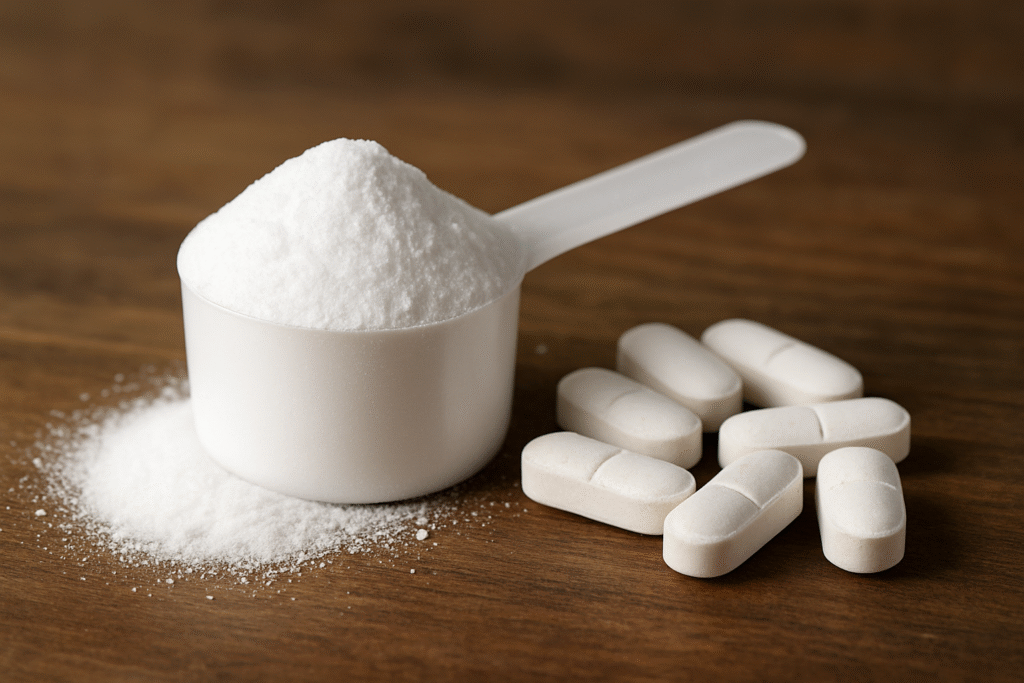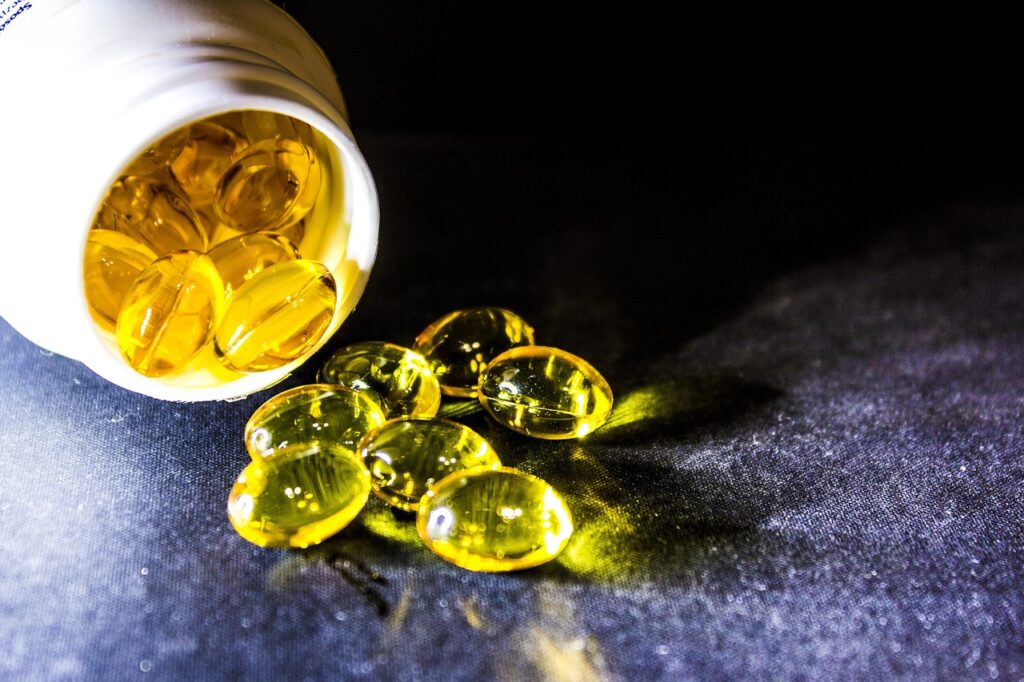Introduction
Creatine is often regarded as the quintessential gym supplement, renowned for its ability to boost strength and muscle mass. However, its reputation as a “muscle builder” only scratches the surface. In recent years, scientists have uncovered a range of benefits that extend far beyond athletic performance, including cognitive enhancement, neuroprotection, and support for healthy aging. This article explores the science behind creatine—what it is, how it works, its proven benefits, and how to use it safely.
What Is Creatine and How Does It Work?
Creatine is a naturally occurring compound synthesized from the amino acids glycine, arginine, and methionine, primarily in the liver and kidneys. About 95% of the body’s creatine is stored in skeletal muscle as phosphocreatine, with the remainder found in the brain and other tissues. Dietary sources include red meat, poultry, and fish.
Creatine’s primary role is to support the rapid regeneration of adenosine triphosphate (ATP), the body’s main energy currency. During high-intensity, short-duration activities (like sprinting or lifting), phosphocreatine donates a phosphate group to ADP, quickly replenishing ATP and enabling sustained performance (Kreider et al., 2017).
Performance and Muscle Benefits
Creatine is one of the most extensively studied and effective supplements for athletes and fitness enthusiasts. Its benefits include:
- Increased Strength and Power: Supplementation consistently improves maximal strength, power output, and performance in repeated high-intensity efforts (Kreider et al., 2017; Rawson et al., 2011).
- Muscle Hypertrophy: By increasing water content within muscle cells and supporting greater training volume, creatine fosters an anabolic environment that promotes muscle growth over time (Candow et al., 2008).
- Enhanced Recovery: Creatine has been shown to reduce muscle cell damage and inflammation following intense exercise, supporting faster recovery and greater training frequency (Glaister et al., 2022).
Meta-analyses and position stands confirm these effects across a wide range of populations and training modalities (Kreider et al., 2017).
Beyond the Gym: The Cognitive and Health Benefits
Creatine’s benefits are not limited to muscle:
- Cognitive Function: Supplementation can improve working memory, information processing, and mental fatigue, particularly in sleep-deprived individuals, older adults, and vegetarians (Xu et al., 2024).
- Neuroprotection: Research suggests creatine may help protect brain cells from damage associated with neurodegenerative diseases and acute injuries (Andres et al., 2011).
- Metabolic and Age-Related Health: Creatine may support healthy glucose metabolism and improve muscle function in older adults, potentially reducing the risk of age-related sarcopenia (Candow et al., 2008).
Common Myths and Misconceptions
Despite decades of research, several myths persist:
- “Creatine Causes Kidney Damage”: Large-scale studies in healthy individuals show no adverse effects on kidney function when used as recommended (Kreider et al., 2017).
- “Creatine Is a Steroid”: Creatine is a natural compound, not a hormone or steroid.
- “You Need to Cycle Creatine”: There is no evidence that cycling is necessary; continuous daily use is safe (Kreider et al., 2017).
- “Creatine Causes Water Retention”: Creatine increases water content within muscle cells, but does not cause problematic bloating or subcutaneous water gain.
- “It’s Only for Men or Athletes”: Women, older adults, and vegetarians can all benefit from creatine supplementation (Candow et al., 2008).
Dosing and Supplementation Guidelines
- Form: Creatine monohydrate is the gold standard—safe, effective, and affordable.
- Dosing: A loading phase of 20 grams per day (split into 4 doses) for 5–7 days can rapidly saturate muscle stores, followed by a maintenance dose of 3–5 grams daily. Alternatively, simply taking 3–5 grams daily will achieve full saturation over several weeks without a loading phase (Kreider et al., 2017).
- Who Should Take It: Creatine is safe for most healthy adults, including athletes, older adults, and vegetarians. Those with pre-existing kidney disease should consult a physician.
- What to Expect: Most users notice improvements in strength, training performance, and recovery within weeks. Cognitive benefits may be more subtle and population-dependent.
Conclusion
Creatine is among the most well-researched and cost-effective supplements available. Its benefits extend beyond muscle and performance, supporting brain health, healthy aging, and overall well-being. For most people, creatine is a safe and worthwhile addition to a health and fitness regimen.
References:
- Kreider, R.B., Kalman, D.S., Antonio, J., Ziegenfuss, T.N., Wildman, R., Collins, R., Candow, D.G., Kleiner, S.M., Almada, A.L., & Lopez, H.L. (2017). International Society of Sports Nutrition position stand: safety and efficacy of creatine supplementation in exercise, sport, and medicine. Journal of the International Society of Sports Nutrition, 14, 18.
- Rawson, E.S., Stec, M.J., Frederickson, S.J., & Miles, M.P. (2011). Effects of creatine supplementation and resistance training on muscle strength and weightlifting performance. Journal of Strength and Conditioning Research, 25(8), 2295–2303.
- Candow, D.G., Chilibeck, P.D., Facci, M., Abeysekara, S., & Zello, G.A. (2008). Effect of creatine supplementation during resistance training on muscle accretion in the elderly. Medicine & Science in Sports & Exercise, 40(5), 1058–1063.
- Glaister, M., Patterson, S.D., Pattison, J.R., & McInnes, G. (2022). Effects of Oral Creatine Supplementation on Power Output during Repeated Sprints on a Non-Motorized Treadmill. Journal of Strength and Conditioning Research, 36(3), 773–778.
- Xu, Y., Bi, X., Zhang, J., & Luo, H. (2024). The effects of creatine supplementation on cognitive function in adults: a meta-analysis. Frontiers in Nutrition, 11, 1424972.
- Andres, R.H., Ducray, A.D., Schlattner, U., Wallimann, T., Widmer, H.R. (2011). Neuroprotective effects of creatine. Amino Acids, 40(5), 1305–1313.


